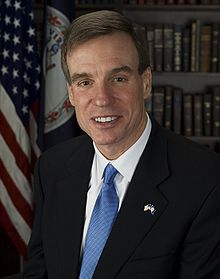Mark R. Warner
| Mark Warner | |
|---|---|
 |
|
| Vice Chair of the Senate Democratic Caucus | |
|
Assumed office January 3, 2017 Serving with Elizabeth Warren |
|
| Leader | Chuck Schumer |
| Preceded by | Chuck Schumer |
| Vice Chair of the Senate Intelligence Committee | |
|
Assumed office January 3, 2017 |
|
| Leader | Richard Burr |
| Preceded by | Dianne Feinstein |
|
United States Senator from Virginia |
|
|
Assumed office January 3, 2009 Serving with Tim Kaine |
|
| Preceded by | John Warner |
| Chair of the National Governors Association | |
|
In office July 20, 2004 – July 18, 2005 |
|
| Preceded by | Dirk Kempthorne |
| Succeeded by | Mike Huckabee |
| 69th Governor of Virginia | |
|
In office January 12, 2002 – January 14, 2006 |
|
| Lieutenant | Tim Kaine |
| Preceded by | Jim Gilmore |
| Succeeded by | Tim Kaine |
| Personal details | |
| Born |
Mark Robert Warner December 15, 1954 Indianapolis, Indiana, U.S. |
| Political party | Democratic |
| Spouse(s) | Lisa Collis |
| Children | 3 |
| Education |
George Washington University (BA) Harvard University (JD) |
| Signature | |
| Website | Senate website |
Mark Robert Warner (born December 15, 1954) is an American politician and the senior United States Senator from Virginia, in office since 2009. He is a member of the Democratic Party and currently serves as the vice chair of both the Senate Democratic Caucus, per appointment by Minority Leader Chuck Schumer, and of the Senate Intelligence Committee.
Prior to his congressional career, Warner was the 69th Governor of Virginia, holding the office from 2002–06, and is the honorary chairman of the Forward Together PAC. Warner delivered the keynote address at the 2008 Democratic National Convention. Apart from politics, Warner is also known for his involvement in telecommunications-related venture capital during the 1980s; he founded the firm Columbia Capital.
In 2006, he was widely expected to pursue the Democratic nomination in the 2008 U.S. presidential elections; however, he announced in October 2006 that he would not run, citing a desire not to disrupt his family life. Warner was considered to be a potential vice presidential candidate, until he took himself out of consideration after receiving the Democratic nomination for the U.S. Senate.
...
Wikipedia
